Key takeaways:
- Cooking with children emphasizes joy, creativity, and memorable experiences over perfect outcomes.
- Baking together fosters essential life skills, strengthens bonds, and nurtures a sense of achievement in kids.
- Choosing simple recipes and using essential tools enhances the baking experience and encourages exploration.
- Mishaps in baking provide valuable lessons and highlight the fun of creativity and problem-solving in the kitchen.
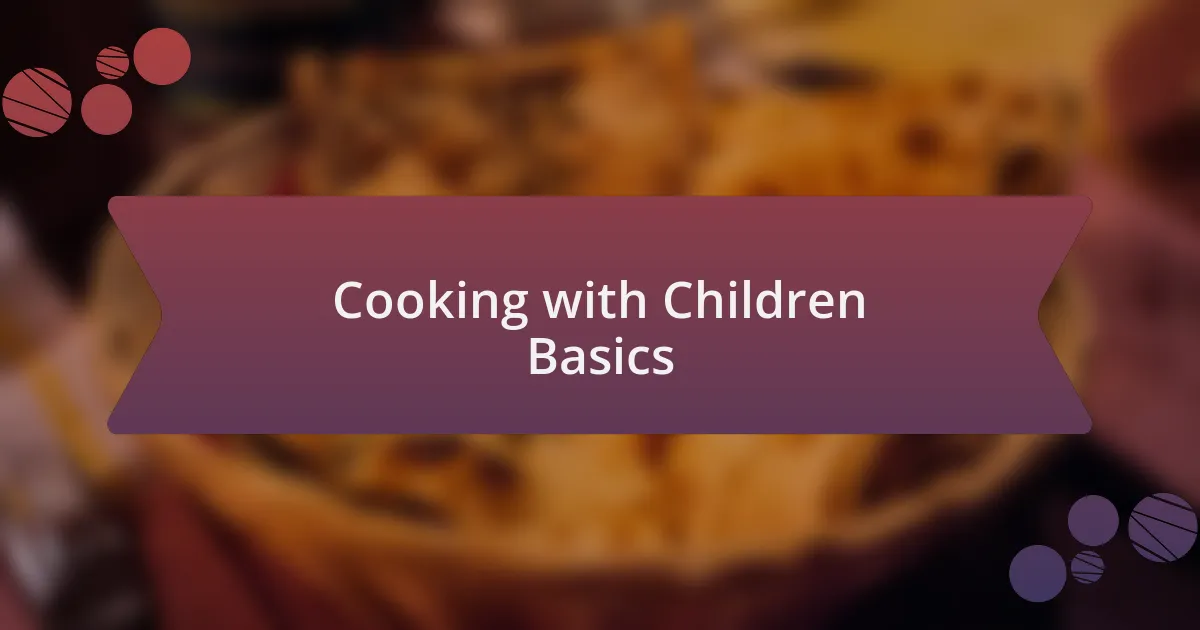
Cooking with Children Basics
Cooking with children is about creating a joyful experience rather than focusing solely on perfect outcomes. I remember baking cookies with my niece, and as much as I monitored her measurements, the laughter and flour fights became the highlight of our day. Isn’t it fascinating how a little mess can turn into a memorable lesson?
Establishing a safe cooking environment is crucial. I learned this the hard way when my son accidentally touched a hot pan while trying to help. I immediately understood that teaching kids about kitchen safety could prevent mishaps. Have you ever thought about how these lessons can shape their confidence in the kitchen for years to come?
Engaging children in the cooking process can ignite their creativity. There was one time my daughter insisted on adding sprinkles to our pancake batter. The colors told a story of imagination, and the pancakes turned out a vibrant mess that delighted us all. How often do we overlook the opportunity to encourage self-expression through cooking?
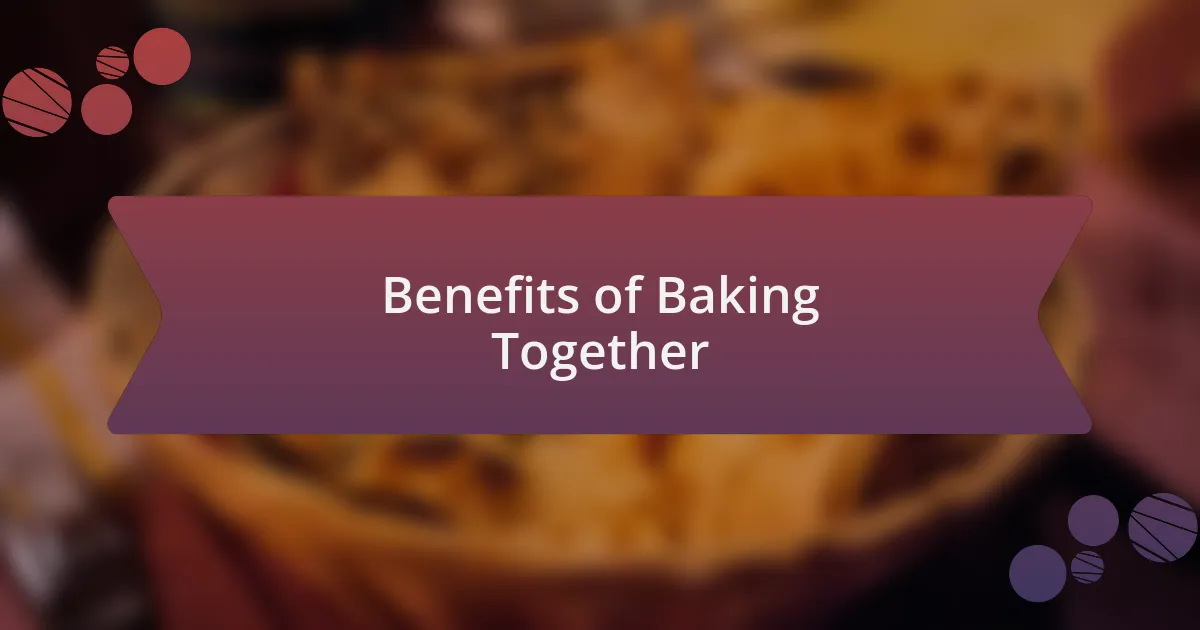
Benefits of Baking Together
Baking together fosters essential life skills in children. I noticed this firsthand when my son proudly took charge of measuring out our ingredients. It was remarkable to watch him grasp concepts like fractions and even basic math through something as simple as dividing a cup into smaller portions. Have you ever realized how baking can cleverly disguise learning in the midst of fun?
Another significant benefit is the bonding time that emerges naturally in the kitchen. I still cherish the afternoons spent baking with my daughter, where we would chat about her day while our cookies baked. There’s something special about working side by side, creating a shared goal, and of course, enjoying the delicious results together. Doesn’t this make baking more than just following a recipe?
Baking also nurtures a sense of achievement in kids. I’ll never forget the look on my niece’s face when she pulled her first batch of muffins out of the oven. It was pure joy! This moment was not just about the baking; it was about building her confidence to try new things. Isn’t it empowering to see a child realize their potential through a few simple ingredients?

Choosing Simple Recipes
Choosing simple recipes is essential when baking with kids. I remember the first time I let my daughter help with brownies; we used a recipe that required only a few ingredients. The joy on her face while stirring the mix was contagious. It’s amazing how the less complicated the process, the more engaged they seem. Isn’t it great to see them so excited about something so basic?
I’ve found that recipes requiring minimal steps not only make for a smoother experience but also allow for more exploration. One rainy Saturday, we tried a no-bake cookie recipe that involved just mixing and chilling. Instead of overwhelming her with complicated techniques, we simply focused on measuring and pouring. The instant gratification of tasting a treat they helped create truly makes a lasting impression. Can you think of a recipe that would bring out that same enthusiasm in your child?
When selecting recipes, I always aim for those that incorporate familiar flavors. Baking orange-flavored muffins was a win because my son loves citrus. Picking something he already enjoys ensures his participation and keeps the energy high. Isn’t it rewarding to not only create something delicious but also to nurture your child’s preferences in the kitchen?
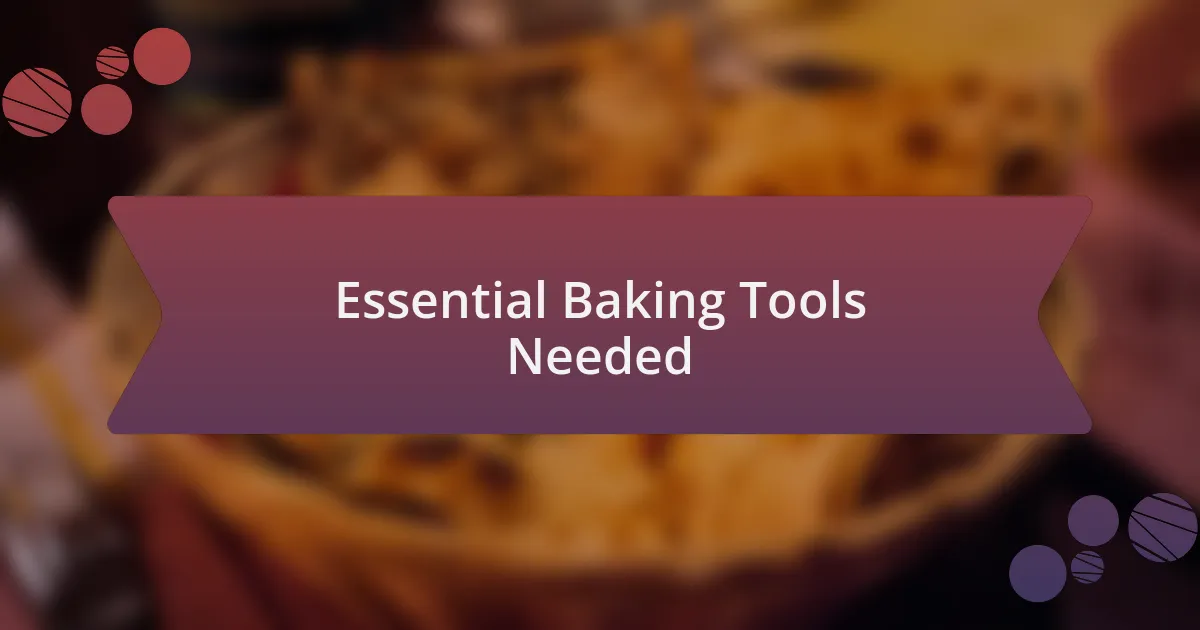
Essential Baking Tools Needed
Baking requires some essential tools that can make the experience smoother and more enjoyable, especially with kids. I’ve found that having a good mixing bowl is vital; whether it’s for dough or batter, I love using a large, sturdy bowl. The joy doubles when kids witness ingredients come together, their tiny hands mixing while giggling at the mess they’re making. Have you ever noticed how kids are more intrigued when they can visibly see the transformation happening?
Measuring cups and spoons are a must-have, too. I recall a delightful moment when my daughter took her time measuring out flour, carefully leveling off each cup. It wasn’t just math; it was also learning about ratios and proportions in the simplest form. Watching them grasp these concepts while baking is incredibly rewarding. What’s better than sneaking in some education while making cookies?
A sturdy baking sheet is another essential tool that I can’t stress enough. During our adventures with cookie dough, I learned that a non-stick surface makes it easier for kids to transfer their creations without breaking them apart. More importantly, it creates a safe space for them to experiment. Isn’t it wonderful how these seemingly simple tools can spark creativity and foster a love of baking in children?

Tips for Successful Baking
When it comes to successful baking with kids, a clear plan is essential. I always find that preparing the ingredients beforehand makes a huge difference. I remember one time, we had everything laid out, and it turned into a mini cooking class. The excitement was palpable as my son began to understand the step-by-step process. Isn’t it amazing how a little organization can turn chaos into creativity?
Another tip that truly enhances the baking experience is to embrace the mess! Kids are naturally curious and sometimes clumsy, but that’s part of the fun. I specifically recall my daughter, covered in flour from head to toe, laughing uproariously as she accidentally knocked over the sugar jar. Instead of fretting over the mess, I chose to celebrate her enthusiasm. What better way to foster a love for baking than to let them express themselves freely?
Lastly, I’ve learned that patience is key, both for you and the kids. Baking can be a slow process, and it’s easy to feel overwhelmed. I vividly remember waiting for cookies to cool before devouring them, and those few minutes felt like an eternity. Sharing those moments of anticipation and excitement teaches children the value of patience. After all, the best things in life are worth the wait, right?
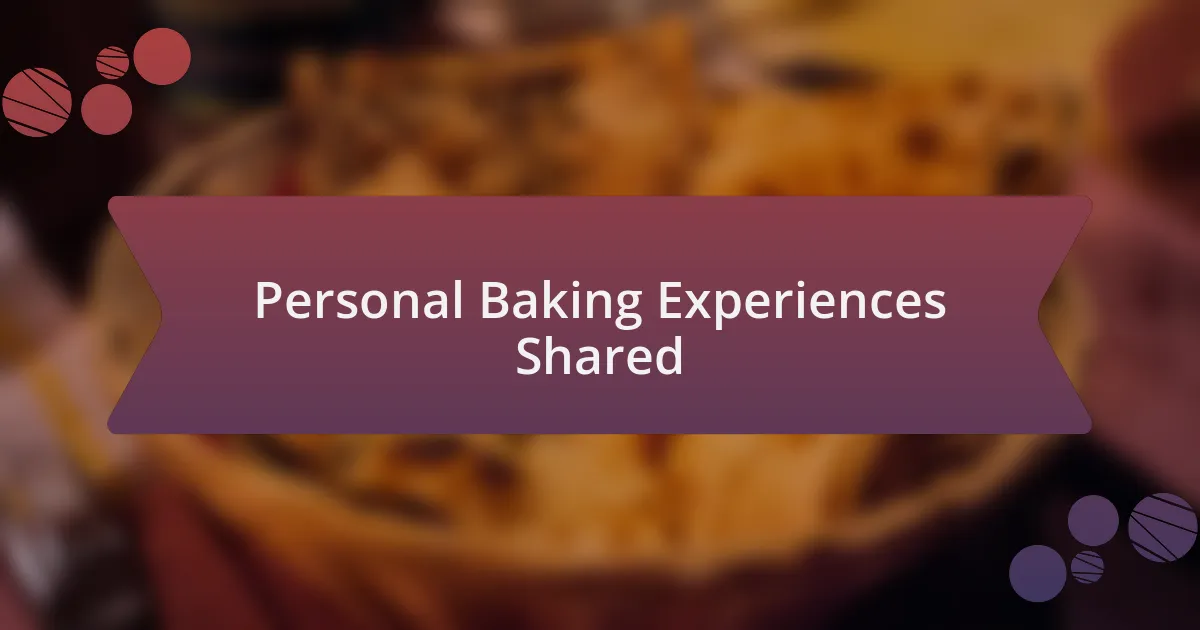
Personal Baking Experiences Shared
Baking with kids has not only deepened our bond but also sparked countless memorable moments. One rainy afternoon, we decided to tackle a chocolate chip cookie recipe together. The anticipation in the air was thick as we measured the chocolate chips, and I couldn’t help but smile when my son, with flour-dusted cheeks, declared himself the official “chocolate chip inspector.” Moments like these remind me how baking can be a delightful adventure rather than just a task.
The joy of discovery often comes unexpectedly in the kitchen. I remember a time when we were attempting to make bread from scratch. My daughter was convinced that kneading dough was her new favorite workout! Her face lit up with glee when she first saw how the dough transformed as she worked with it. Watching her realize that baking is more than just following a recipe – it’s about the creativity and transformation involved – was a true highlight for me.
Even with the best intentions, patience is sometimes tested when baking with little ones. Just the other day, as we waited for muffins to rise in the oven, my daughter, clearly growing impatient, burst out, “Why can’t we eat them right now?” Her genuine eagerness perfectly encapsulated the thrill of baking. It was a beautiful reminder that every moment leading to that first bite is part of the experience, and sometimes, it’s in the waiting where the magic truly happens.
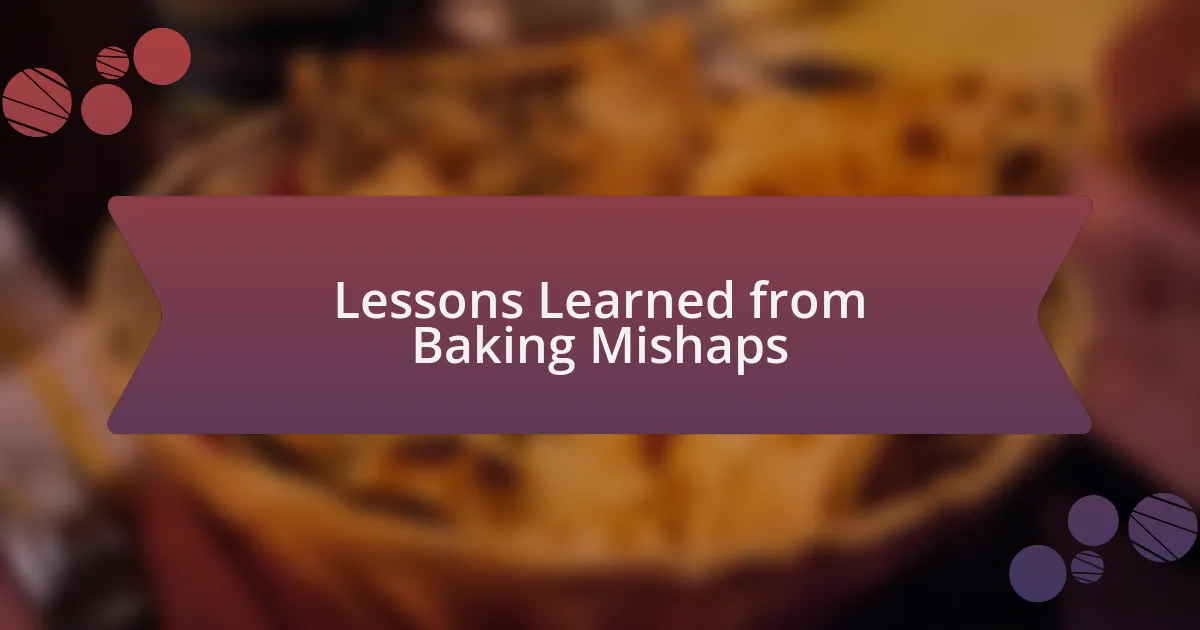
Lessons Learned from Baking Mishaps
Baking mishaps often turn into the most memorable learning experiences. One day, my son mixed up tablespoons and teaspoons while adding salt to our cookie dough, resulting in a taste that was far too salty. What did I learn from this? Sometimes, it’s the mistakes that teach our little chefs the importance of measuring accurately. I still chuckle when he reminds me, “Remember, we don’t want cookies that taste like the ocean!”
Another time, we were attempting to bake a cake together, and I wasn’t paying close attention when my daughter opened the oven door. The blast of cold air caused the cake to sink in the middle! Instead of getting frustrated, I turned it into a lesson about how baking requires both precision and respect for the ingredients. I asked her, “Do you think we can make this work again?” We ended up making a delightful trifle with the fallen cake, which turned out to be a fantastic discovery. It taught us that even mistakes can pave the way for creativity in the kitchen.
There are times when a recipe just doesn’t go as planned, and that’s perfectly okay. I recall a moment when our attempt at making homemade pizza resulted in a dough that simply wouldn’t rise. Instead of being upset, we laughed it off and had a pizza-making party with some pre-made dough we had on hand. It reminded me of an essential truth: the process can be far more valuable than the final product. Don’t you think it’s those unexpected twists that keep baking exciting and connected?